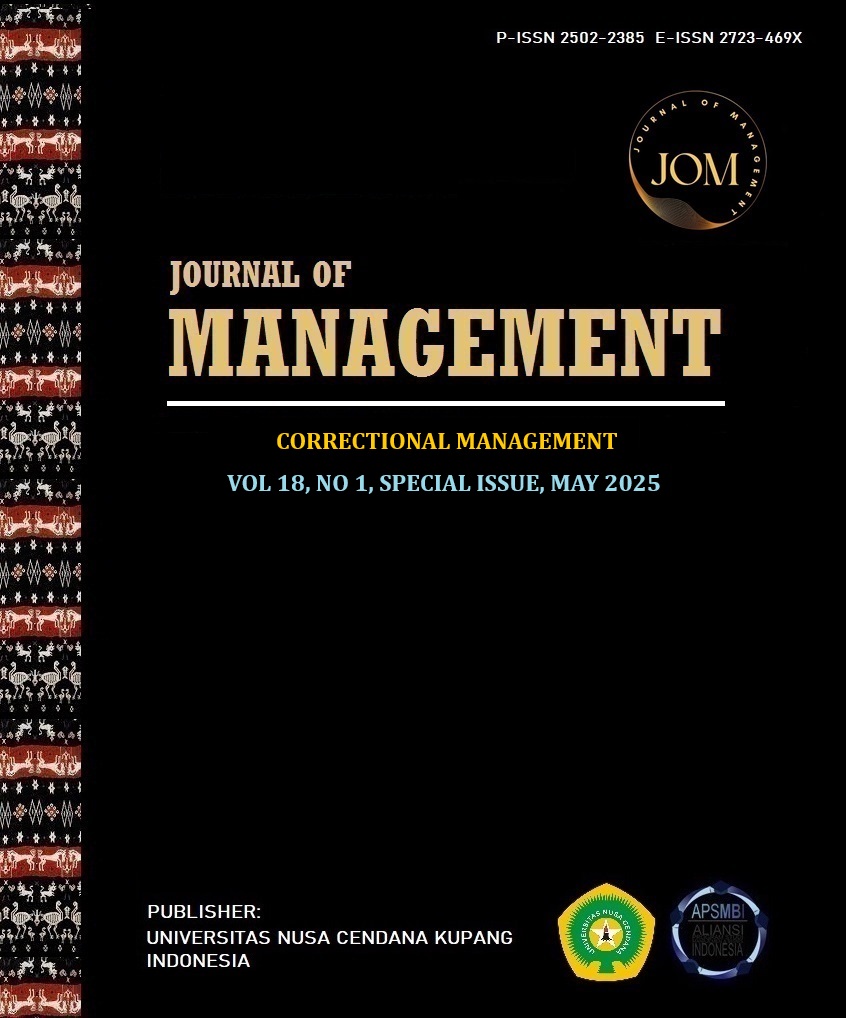CONTROL OF SEXUAL DEVIANT BEHAVIOR OF MALE INMATES IN CLASS I DETENTION CENTER LABUHAN DELI
Abstract
Sexual deviant behavior often occurs in prisons and detention centers in Indonesia. This occurs due to several factors, such as limited fulfillment of sexual needs, psychological pressure, hierarchy between prisoners, and overcrowding conditions. Labuhan Deli Class I Detention Center experiences significant overcrowding with 1525 residents for a capacity of 500 people, which has the potential to trigger sexually deviant behavior. The purpose of this study is to determine the form of sexual deviant behavior of male inmates at the Class I Labuhan Deli State Detention Center and to determine efforts to control the sexual deviant behavior of male inmates. The method used in this research is descriptive qualitative, which examines thoroughly and in depth what is being studied using data collection techniques such as interviews, observations, and documentation studies. This research uses Abraham Maslow's Hierarchy of Needs Theory, which states that sexual needs are basic needs that must be fulfilled by every human being. The results of the study found that there were 6 prisoners involved in sexually deviant behavior in the detention center. The forms of sexual deviant behavior that occur in the Labuhan Deli Class I Detention Center are homosexuality and sexual practices using anal and oral. Factors that cause deviant behavior are the overcrowded conditions of the detention center and the unchanneled sexual needs of prisoners. Therefore, the efforts made to control the sexual deviant behavior of prisoners in the Labuhan Deli Detention Center are with a preemptive strategy, namely separating prisoners involved in sexual deviations and then recording them in the F register book, providing independent services and personality services, and conducting routine HIV screening.
Keywords: Homosexuality; Deviant Behaviour; Prisoners
Downloads
References
https://doi.org/10.30983/humanisme.v3i2.2415
Asmarani, D. (2018). Kepanikan Moral dan Persekusi atas Minoritas Seksual di Indonesia - Magdalene.co. In Magdalene.co. https://magdalene.co/story/tiada-tempat-untuk-lgbt-kepanikan-moral-dan-persekusi-atas-minoritas-seksual-di-indonesia/
Azmi, C., Muhammad, R. A., & Rizanizarli, R. (2020). Pemidanaan Terhadap Pelaku Homoseksual ditinjau dari Perspektif Hak Asasi Manusia di Indonesia. Jurnal Magister Hukum Udayana (Udayana Master Law Journal), 9(1), 45. https://doi.org/10.24843/jmhu.2020.v09.i01.p04
Cooper, R. (2017). Diagnostic and statistical manual of mental disorders (DSM). Knowledge Organization, 44(8), 668–676. https://doi.org/10.5771/0943-7444-2017-8-668
Dawam, A. (2019). Sigmund Freud dan Homoseksual (Sebuah Tinjauan Wacana Keislaman). Musawa Jurnal Studi Gender Dan Islam, 2(1), 41. https://doi.org/10.14421/musawa.2003.21.41-60
Faradiba, N. (2021). 13 Macam Perilaku Menyimpang Seksual. Termasuk Hiperseks. Kompas.Com. https://www.kompas.com/sains/read/2021/10/06/190000423/13-macam-perilaku-menyimpang-seksual-termasuk-hiperseks?page=all
Lianawati, E. (2020). Oleh : Ester Lianawati. Universitas Atma Jaya, 7(May), 10–15.
Mazda, G. I. O. (2021). Analisis Kriminologi Terhadap Geng Perempuan Di Lapas (Studi Kasus Lapas Perempuan Kelas II A Pekanbaru).
Sugiyono. (2013). Metode Penelitian Kuantitatif Dan Kualitatif Serta R&D. In Alfabeta, CV (Issue April).
Tito, H. R. (2022). Parlemen Rusia Sahkan UU Anti-LGBT, Begini Aturan dan Sanksinya.
Yakin, I. H. (2023). Metodologi Penelitian (Kuantitatif & Kualitatif) (U. Supriatna (ed.); Issue September). CV. AKSARA GLOBAL AKADEMIA.
Yoon, C. (2014). Motivasi Tokoh Utama Berdasarkan Teori Abraham Maslow Pada Novel Kisah Untuk Geri Karya Erisca Febriani Motivations. Paper

 Santa Veronica Sirait(1*)
Santa Veronica Sirait(1*)



